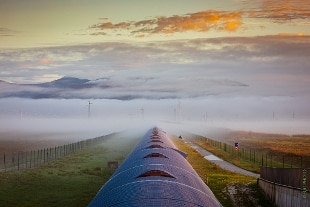Climate, it was the hottest third of July ever
Eurostat report, Gentiloni: insufficient progress on climate and gender gap
Climate, May 2020 the hottest in the world
Climate.
North Pole without ice in the summer before 2050
Share
11 September 2020 The University of Pisa, the European Gravitational Observatory (EGO) and the scientific collaboration Virgo have signed an agreement for the sharing of data on the trend of wave motion in the Tyrrhenian Sea.
By accessing seismic activity data recorded by the Virgo interferometer over the past 15 years, the University's biologists will be able to study the effects of climate change on coastal erosion and marine ecosystems and contribute to forecasting sea level rise in the coming years.
Virgo interferometer
With its two 3-kilometer arms nestled in the Pisan countryside, near Cascina, the Virgo interferometer is one of the three largest and most sensitive gravitational wave detectors in the world, capable of measuring length variations of its smaller arms with a diameter of one proton: one billionth of a millionth of a meter.
Precisely in order to reveal the oscillations of space-time, generated millions or even billions of light years from the Earth, Virgo physicists need in fact to recognize (and if possible shield the detector from) all the 'noises' of human or environmental origin. , which could cover the faint gravitational signals: seismic vibrations and tidal movements, sounds and perturbations of human origin, such as airplanes, agricultural or industrial activities, up to the minimum periodic movements of the earth's crust or the 'beats' of wind turbines.
"At the same time, this grueling hunt for external perturbations makes the interferometer and the corollary of sensors it uses, a large and very sensitive ear that listens to the environmental context in which it is immersed - says Stavros Katsanevas, director of the European Gravitational Observatory. of Pisa.
"And, potentially, it transforms Virgo and EGO into an extraordinary laboratory to study environmental phenomena: for example, seismic activity or tidal trends and wave motions near the Tuscan coast."
Studies of the University of Pisa
What EGO and Virgo can provide biologists at the University of Pisa is a direct measure of the impact of the waves on the coast line, which is reflected in the interferometer seismic sensors.
In addition, the large temporal resolution of the data made available by physicists, will allow a team that sees the collaboration between biologists and geologists of the Pisa University to build more precise models of coastal erosion and predict how much climate change can intensify in the future storms, extreme weather events or currents warmer seas and their impact on coastal marine biodiversity.
"The comparison with the data, which we have been collecting for over 20 years, on the populations of algae and invertebrates along the Livorno coast - says Lisandro Benedetti-Cecchi, professor of Ecology and pro rector of European and International Research of the University of Pisa - could help us establish a link, not yet well studied, between
global climate change and variations in marine biodiversity along the coasts.
And also to define how much and whether the presence of marine micro- and macro-organisms actually contributes to mitigating the impact of coastal erosion. "
Data collected for 15 years By
comparing the historical series of biological data and those collected in the last 15 years by Virgo it will be possible to determine more precisely the changes in sea level in the past and therefore contribute to the projections on the growth of this level in the coming years.
“In the last decades we have collected and archived a set of environmental data (seismic, meteorological, electromagnetic pollution) that is almost unique in terms of vastness and temporal continuity - says Giovanni Losurdo, spokesperson of the international scientific collaboration that Virgo operates.
"I am convinced that the sharing of this data and interdisciplinary collaboration will produce interesting developments and important innovations in many unexpected fields in the coming years."
"In this direction, our first and most natural interlocutor is the University of Pisa - concludes Stavros Katsanevas, director of EGO - and that is why we are particularly happy with the signing of this agreement. With the hope that it will be a further step in the ever closer and more profitable connection between all the scientific and technological excellence of Tuscany. "

